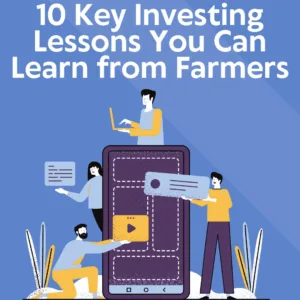
In the realm of investing, valuable lessons can often be found in unexpected places.
Farmers, with their deep connection to the land and the rhythms of nature, offer a wealth of wisdom that can be applied to financial markets and investment strategies.
Farmers possess a deep understanding of agriculture and farming practices because they are directly involved in the cultivation of crops and the raising of livestock.
Their knowledge is built upon years of hands-on experience, passed down through generations, and honed through continuous learning and adaptation to changing conditions.
Farming knowledge is often passed down from one generation to the next within farming families.
Children grow up learning from their parents and grandparents, absorbing traditional techniques, agricultural wisdom, and invaluable insights gained over decades of farming experience.
This intergenerational transfer of knowledge ensures that farming expertise is preserved and enriched over time.
Here are 10 key investing lessons you can learn from farmers, each explained in detail:
1. Patience and Long-Term Vision:
Farmers understand that their efforts may not yield immediate results.
They patiently nurture their crops, knowing that it takes time for seeds to grow into harvestable produce. Similarly, successful investing requires a long-term perspective.
Markets may fluctuate in the short term, but holding onto quality investments over time can lead to significant growth and returns.
2. Diversification:
Farmers diversify their crops to mitigate the risk of poor weather or market conditions impacting their entire livelihood.
Likewise, investors can diversify their portfolios across different asset classes, industries, and geographic regions to spread risk and enhance resilience to market volatility.
3. Risk Management:
Farmers are adept at managing risks inherent in agriculture, such as weather-related disasters or crop diseases.
Similarly, investors must identify and manage risks in their portfolios, whether it’s through diversification, hedging strategies, or maintaining an emergency fund to weather financial storms.
4. Adaptability to Changing Conditions:
Farmers must adapt to changing environmental conditions, market trends, and technological advancements to thrive.
Similarly, successful investors remain flexible and open to adjusting their strategies in response to changing economic conditions, regulatory shifts, or emerging market opportunities.
5. Focus on Quality:
Farmers prioritize the quality of their crops, ensuring they meet high standards to command premium prices in the market.
Likewise, investors should focus on quality when selecting investments, seeking companies with strong fundamentals, competitive advantages, and sustainable growth prospects.
6. Continuous Learning and Improvement:
Farmers constantly learn from experience, experimenting with new techniques, and staying informed about industry innovations.
Similarly, investors should commit to ongoing education, staying abreast of market trends, economic indicators, and investment strategies to make informed decisions.
7. Conservation and Sustainability:
Farmers recognize the importance of conserving natural resources and adopting sustainable practices to ensure the long-term viability of their land.
Likewise, investors can incorporate environmental, social, and governance (ESG) factors into their investment decisions, supporting companies that prioritize sustainability and responsible business practices.
8. Resilience in the Face of Adversity:
Farmers are resilient in the face of challenges, whether it’s coping with crop failures, market downturns, or external crises.
Similarly, investors must cultivate resilience, maintaining a disciplined approach, and staying focused on long-term goals during periods of market turbulence or personal setbacks.
9. Community and Collaboration:
Farmers often rely on cooperation and mutual support within their communities, sharing resources and knowledge for collective benefit.
Likewise, investors can benefit from collaboration, whether it’s through networking with peers, seeking advice from financial professionals, or participating in investment clubs or forums.
10. Harvesting and Reinvestment:
Farmers understand the importance of timing when it comes to harvesting crops and reinvesting resources for future growth.
Similarly, investors should periodically review their portfolios, rebalance asset allocations, and reinvest dividends or profits to optimize returns and align with their financial goals.
Farmers offer invaluable insights into the principles of patience, resilience, and stewardship that are essential for successful investing.
By applying these 10 key lessons from the agricultural world, Investors can cultivate a disciplined and sustainable approach to navigating the complexities of financial markets and achieving long-term prosperity.

Thank you for the auspicious writeup It in fact was a amusement account it Look advanced to more added agreeable from you By the way how could we communicate
Hi Neat post Theres an issue together with your web site in internet explorer may test this IE still is the marketplace chief and a good component of people will pass over your fantastic writing due to this problem
Your point of view caught my eye and was very interesting. Thanks. I have a question for you.
Your point of view caught my eye and was very interesting. Thanks. I have a question for you.
Your point of view caught my eye and was very interesting. Thanks. I have a question for you.
Can you be more specific about the content of your article? After reading it, I still have some doubts. Hope you can help me.
Can you be more specific about the content of your article? After reading it, I still have some doubts. Hope you can help me.
Your article helped me a lot, is there any more related content? Thanks! https://www.binance.com/zh-TC/register?ref=VDVEQ78S
Can you be more specific about the content of your article? After reading it, I still have some doubts. Hope you can help me.